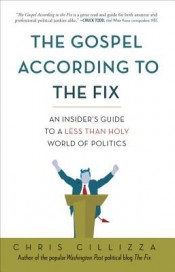Title: The Gospel According to The Fix: An Insider’s Guide to a Less Than Holy World of Politics
Author: Chris Cillizza
Genre: Nonfiction
Year: 2012
Publisher: Broadway Paperback
Acquired: From the publisher for review consideration
Rating: 




Review: What are the top ten issues that candidates should be discussing during this election, but won’t be because of the economy? How is Ron Paul’s run for president like Friday Night Lights? What are five ways we could reform Congress to make it work better?
If those questions or their answers intrigue you, then The Gospel According to The Fix by Chris Cillizza is a book you should get your hands on as soon as you can.
The Gospel According to The Fix is Cillizza’s basic primer to the world of national politics by Chris Cillizza, a contributor to The Washington Post’s political blog, The Fix. Cillizza is a political reporter for The Washington Post and writes their political blog, The Fix. And his credentials don’t stop there – Cillizza is also a contributor to MSNBC as a political analyst and has written for The Atlantic, Washingtonian, and Slate. The guy clearly knows his stuff, and that shows on every page of this book.
The best thing about The Gospel According to The Fix is, I think, how well balanced the book is. Cillizza doesn’t advocate for or against any candidates, and the book is less about particular political issues and more about how those issues play out in the political arena. If you don’t appreciate the logic behind political posturing or decision making, then the book would probably be less enjoyable. But I seem to find that discussion fascinating, even if it also makes me frustrated.
The one tiny thing that keeps this book from getting five stars from this political nerd is timeliness. The risk of turning a blog about politics into a book is that the examples Cillizza uses almost immediately feel a little bit dated. For example, in a discussion about gun control, Cillizza discusses the way the Gabrielle Giffords’ shooting in Tucson reinvigorated the national discussion of gun control, which then promptly fell off the radar again. The reference to Giffords, while totally valid, feels a little out of touch in light of the shooting in Aurora just a couple months ago.
I don’t think the timeliness issue is a reason to skip this book. The majority of the book is about the American political system more generally – a hierarchy of political endorsements, a single-step fix for campaign finance reform, the story of journalist Ben Cramer – and I think will still be relevant well past November. However, to get the most out of the book I suggest picking it up as soon as you can – I’m certain every political nerd out there will find it as informative and enjoyable as I did.
Other Reviews:
If you have reviewed this book, please leave a link to the review in the comments and I will add your review to the main post. All I ask is for you to do the same to mine — thanks!


Comments on this entry are closed.
I became jaded when it comes to politics years ago so this probably isn’t for me.
Parts of it might be. I liked the several chapters Cillizza devoted to the process of how politics works (really, it’s a theme in every chapter). It is certainly frustrating to read about how things don’t work (the bottleneck in Congress, for example), but it’s also sort of nice to try to understand what is going on.
Yes, politics is frustrating. But it would be a good idea for me to read this so I can understand WHY I find it so frustrating. What bugs me the most is that I like some valid point on all the parties and to be told I must dislike that candidate because he is from such and such a party just makes my head hurt.
That’s part of what I feel too — neither the Democrats or Republicans seem to field candidates that represent what I think. It ends up being a matter of picking a few issues that matter most and trying to vote for candidates that way, which ends up not working when they change their minds!
This book sounds right up my alley! I am particularly interested in it since you feel it’s a balanced treatment of the subject. I’m adding it to my list.
It felt very balanced to me. Cillizza clearly has a perspective on politics, but it doesn’t seem to be a perspective that necessitates taking sides on issues. That can be really hard to come by.
About time for a book that actually focuses on issues rather than people or parties. This will definitely be on my to-read list. I definitely understand what you’re saying about timeliness, maybe we’ve all become too spoiled with the endless updates and news coverage?
I think it’s maybe more accurate to say the book is about the political system, rather than individual candidates or issues. There are a lot of profiles of people, but it’s usually in a context of how the bigger political system operates. That’s a subtle difference, maybe, but I think important.